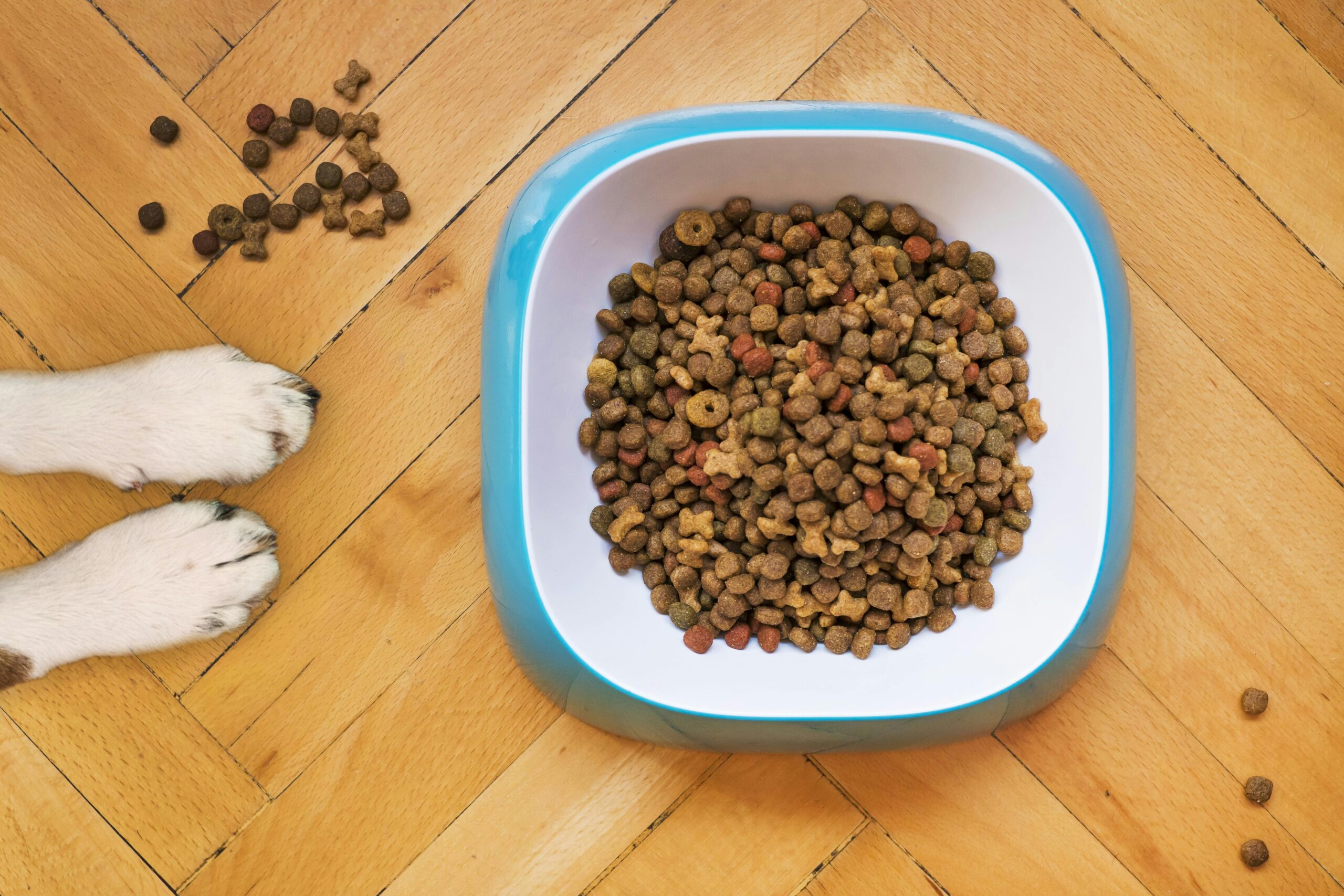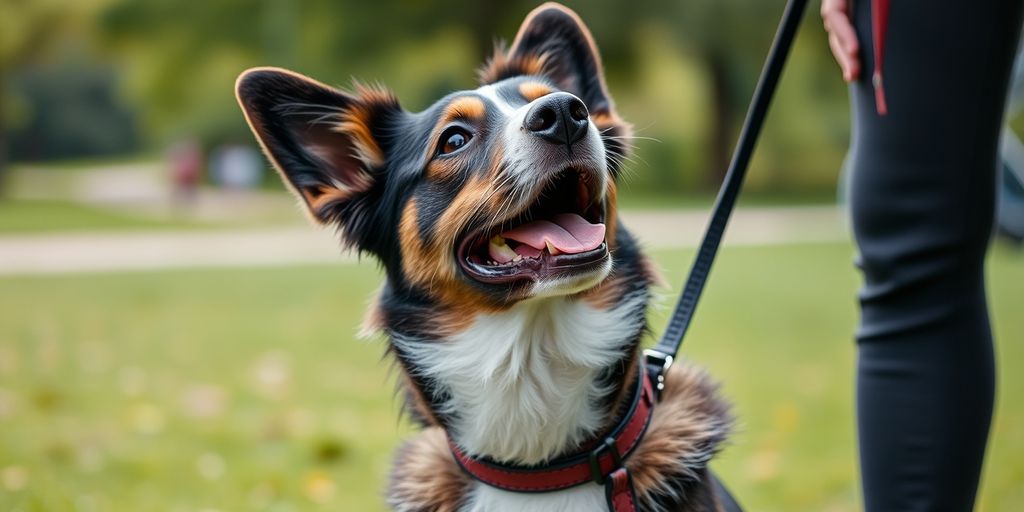Feeding your English Cream Golden Retriever the right diet is crucial for its health and happiness. These dogs have specific nutritional needs that must be met to support their energy levels, maintain their beautiful coats, and prevent common health issues. This guide will help you understand what to feed your English Cream Golden Retriever to ensure it leads a long, healthy life.
Table of Contents
ToggleKey Takeaways
- English Cream Golden Retrievers need a balanced diet rich in proteins, fats, carbohydrates, vitamins, and minerals.
- Choose high-quality dog food by reading labels and selecting products with real meat as the first ingredient.
- Homemade meals can be beneficial but require careful selection of ingredients to ensure nutritional balance.
- Establish a regular feeding schedule and control portions to prevent obesity and other health issues.
- Consult with your veterinarian before making any significant changes to your dog’s diet or introducing supplements.
Understanding the Nutritional Needs of English Cream Golden Retrievers
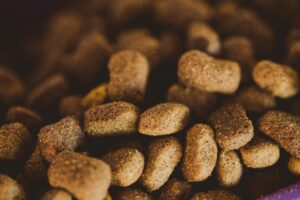
To keep your English Cream Golden Retriever healthy and happy, it’s important to understand their specific nutritional needs. This breed requires a balanced diet that supports their energy levels, maintains their beautiful coat, and prevents common health issues.
Essential Nutrients for Growth
Golden Retrievers need a mix of proteins, fats, carbohydrates, vitamins, and minerals. Proteins are crucial for muscle maintenance, while fats provide energy and support coat health. Carbohydrates offer additional energy, and fiber aids in digestion. Vitamins and minerals are necessary for overall health.
Caloric Requirements by Age
The caloric needs of Golden Retrievers vary by age. Puppies need more calories to support their rapid growth, while adults require a balanced intake to maintain their weight. Senior dogs may need fewer calories but more fiber and antioxidants to support their aging bodies.
Hydration and Its Importance
Proper hydration is essential for Golden Retrievers. They should always have access to clean water to prevent dehydration, which can lead to serious health issues. Hydration supports digestion, nutrient absorption, and overall well-being.
A well-balanced diet tailored to the specific needs of your English Cream Golden Retriever can promote optimal health and longevity.
Choosing the Right Dog Food
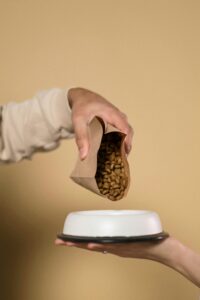
Types of Dog Food Available
When selecting food for your English Cream Golden Retriever, you have several options. These include dry kibble, wet food, and raw diets. Each type has its own benefits and drawbacks. Dry kibble is convenient and helps keep teeth clean, while wet food is more palatable and can be easier to digest. Raw diets aim to mimic what dogs would eat in the wild but require careful preparation to ensure they are balanced.
Reading Dog Food Labels
Understanding dog food labels is crucial for making the right choice. Look for foods where meat is listed as the first ingredient, such as chicken, lamb, or fish. Avoid foods with grains as the first ingredient. Also, steer clear of products containing animal digest or by-products. These can include less desirable parts of the animal, like beaks and feet. Added vitamins and minerals are beneficial, but they should be added after the cooking process to retain their effectiveness.
Selecting High-Quality Ingredients
High-quality dog foods often use ingredients suitable for human consumption. This means they avoid using meat from diseased livestock or condemned material from slaughterhouses. Instead, they use fresh, wholesome ingredients. Look for foods that include multiple sources of protein, such as chicken, fish, and lamb, unless your dog has specific allergies. Avoid foods with artificial colors, flavors, or added sugars. These additives can be harmful to your dog’s health.
Choosing the right food for your English Cream Golden Retriever is essential for their overall health and well-being. Always consult with your veterinarian to ensure you’re making the best choice for your furry friend.
Homemade Diet Options

Benefits of Homemade Meals
Preparing homemade meals for your English Cream Golden Retriever can be a rewarding experience. Homemade meals allow you to control the quality and source of ingredients, ensuring your dog gets the best nutrition. Additionally, it can help in managing food allergies and sensitivities, as you can avoid specific ingredients that may cause issues.
Key Ingredients to Include
When crafting homemade meals, it’s essential to include a balance of proteins, carbohydrates, and fats. Here are some key ingredients to consider:
- Proteins: Lean meats like chicken, turkey, and fish
- Carbohydrates: Brown rice, sweet potatoes, and oats
- Fats: Fish oil and flaxseed oil
- Vegetables: Carrots, spinach, and green beans
- Fruits: Apples and blueberries
Avoiding Harmful Foods
While homemade meals can be beneficial, it’s crucial to avoid foods that are harmful to dogs. Some foods to steer clear of include:
- Chocolate
- Grapes and raisins
- Onions and garlic
- Foods with xylitol
Always consult with your veterinarian before making significant changes to your dog’s diet. They can provide guidance tailored to your dog’s specific needs and ensure a balanced diet.
By focusing on high-quality ingredients and avoiding harmful foods, you can help your English Cream Golden Retriever thrive and enjoy good health and longevity.
Feeding Schedule and Portion Control
Establishing a Feeding Routine
Creating a consistent feeding routine is crucial for your English Cream Golden Retriever. Puppies under six months should be fed 3-4 meals a day to support their rapid growth. Once they reach six months, you can transition to feeding them twice a day. Consistency helps in maintaining their energy levels and prevents low blood sugar.
Determining Portion Sizes
Accurately measuring your dog’s food is essential to avoid overfeeding or underfeeding. Use a measuring cup to ensure you’re giving the right amount. Here’s a simple guide:
| Age | Weight | Recommended Daily Food Intake (Cups) |
|---|---|---|
| 8 weeks | 6-10 lbs | 1/2 – 1 1/2 cups |
| 3 months | 15-20 lbs | 1 1/2 – 2 cups |
| 6 months | 25-40 lbs | 2 1/2 – 3 1/2 cups |
| 9 months | 50-60 lbs | 3 – 4 cups |
Adjusting for Activity Levels
Your dog’s activity level plays a significant role in determining their portion sizes. More active dogs may require more food, while less active dogs may need less. Monitor their weight and body condition regularly, and adjust portions as needed. If your dog is gaining too much weight, reduce the portion size slightly. Conversely, if they seem too thin, increase the portion size.
Remember, every dog is unique. Regularly consult with your veterinarian to tailor the feeding plan to your dog’s specific needs.
Common Dietary Issues and Solutions
Identifying Food Allergies
Golden Retrievers can suffer from food allergies, which may cause symptoms like itching, ear infections, and digestive problems. Identifying and eliminating allergens from their diet is crucial. A limited-ingredient diet or novel protein sources can help pinpoint the cause of allergies.
Managing Weight and Obesity
Obesity is a common issue in Golden Retrievers and can lead to serious health problems like diabetes and heart disease. To manage weight, feed your dog a balanced diet with controlled calories and ensure they get regular exercise. Avoid overfeeding and monitor their weight regularly.
Dealing with Digestive Problems
Golden Retrievers often experience gastrointestinal issues. A diet with easily digestible proteins, probiotics, and the right balance of fiber can support a healthy digestive system, preventing problems like colitis and gastritis. If your dog has ongoing digestive issues, consult your vet for a tailored diet plan.
A well-balanced diet is key to preventing many common health issues in Golden Retrievers. Regular vet check-ups can help catch problems early and keep your dog healthy.
Supplements for Optimal Health
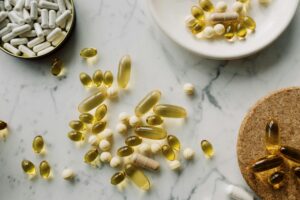
When to Consider Supplements
While a balanced diet is crucial, some English Cream Golden Retrievers may benefit from additional supplements. Supplements can help address specific health needs that regular food might not fully cover. For instance, if your dog has joint issues, adding glucosamine can be beneficial. Always consult your vet before starting any supplement regimen.
Types of Beneficial Supplements
There are several supplements that can support your dog’s health:
- Glucosamine and Chondroitin: These are great for joint health, especially in older dogs.
- Omega-3 Fatty Acids: Found in fish oil, these support a shiny coat and healthy skin.
- Probiotics: These help maintain a healthy digestive system.
- Antioxidants: Vitamins E and C can support eye health and overall immune function.
Consulting with Your Veterinarian
Before adding any supplements to your dog’s diet, it’s essential to talk to your vet. They can provide guidance on the right types and dosages based on your dog’s specific needs. This ensures that the supplements will be effective and safe for your pet.
Proper supplementation can make a significant difference in your dog’s health, but it should always be done under professional guidance.
Transitioning to a New Diet
Signs of a Successful Transition
When switching your English Cream Golden Retriever to a new diet, it’s important to watch for signs that the transition is going well. Healthy stools and consistent energy levels are good indicators. If your dog shows no signs of digestive upset, such as vomiting or diarrhea, you’re on the right track.
Steps for Gradual Change
To avoid upsetting your dog’s digestive system, it’s best to switch your dog to a new food gradually. Start by mixing 20% of the new food with 80% of the old food. Over the course of a week or two, slowly increase the amount of new food while decreasing the old food. This gradual change helps your dog’s stomach adjust to the new diet.
Monitoring Your Dog’s Response
Keep an eye on your dog’s weight and overall health during the transition. If you notice any significant weight loss or gain, consult your veterinarian. It’s also important to monitor your dog’s energy levels and coat condition. A smooth transition will result in a happy, healthy dog.
Conclusion
Feeding your English Cream Golden Retriever the right diet is key to their health and happiness. By understanding their specific nutritional needs and choosing high-quality food, you can help your furry friend live a long, vibrant life. Always remember to consult your vet before making any significant changes to their diet. With the right balance of proteins, fats, carbohydrates, vitamins, and minerals, along with regular exercise, your Golden Retriever will thrive. Keep an eye on their weight and adjust portions as needed to prevent obesity. Every dog is unique, so tailor their diet to fit their individual needs and enjoy the joy they bring to your life.
Frequently Asked Questions
What is the best type of food for an English Cream Golden Retriever?
The best food for an English Cream Golden Retriever is a high-quality dog food that lists real meat as the first ingredient. Make sure it’s balanced with proteins, fats, and carbohydrates, and suitable for their age and activity level.
How much should I feed my English Cream Golden Retriever daily?
The amount of food depends on your dog’s age, weight, and activity level. Typically, adult English Cream Golden Retrievers need about 2 to 3 cups of dry food per day, divided into two meals. Always consult your vet for personalized advice.
Are grain-free diets good for English Cream Golden Retrievers?
Grain-free diets can be beneficial, especially if your dog has grain allergies. However, it’s important to ensure the diet is balanced and meets all nutritional needs. Consult your vet before making any changes.
Can English Cream Golden Retrievers eat human food?
Some human foods are safe for dogs, like lean meats, certain vegetables, and fruits like apples and carrots. However, avoid foods like chocolate, grapes, onions, and anything with xylitol, as they can be harmful.
How often should I feed my English Cream Golden Retriever?
It’s best to feed your English Cream Golden Retriever twice a day—once in the morning and once in the evening. This helps maintain steady energy levels and prevents issues like bloat.
Is it okay to give my English Cream Golden Retriever bones to chew?
Giving bones can be risky. Cooked bones can splinter and cause internal injuries. If you give bones, make sure they are large, uncooked bones like beef or lamb shanks, and always supervise your dog while they chew.

